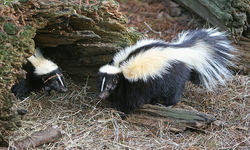Skunk spray: a proven method to remove it, and food for thought on its other effects

Photo courtesy of Tom Friedel
According to chemist Paul Krebaum, a solution of 3 percent hydrogen peroxide, baking soda and liquid soap will neutralize the skunk spray. It's fascinating how it works. Thiols are the organic compounds responsible for the odor in skunk spray. The chemical composition in a simple recipe changes the thiols' ability to do their thing by oxidizing them.
The pungent, unmistakeable smell of skunk musk is only one reason for concern. If your pet has been sprayed in the eyes, get in touch with your vet, as the spray can cause intense pain, although permanant blindness is not usually the case. However, if you notice any out-of-the-ordinary behavior or symptoms from your pet after the incident, you might want to consult your vet. Researchers from Michigan State University are doing a study on the effects of toxins in skunk spray. Small dogs are more prone to more significant problems from being sprayed. In rare cases, the skunk spray can enter the lungs, causing death.
Use care when bathing your pet if it has been sprayed by a skunk. Some people have experienced some reactions themselves, like itching and respiratory difficulty.
And, for the record, tomato juice is not effective in resolving the issue. It will only frustrate you, and leave you with a humiliated, slightly pink pet.
Lorrie Shaw is a pet blogger, a regular contributor to AnnArbor.com and owner of Professional Pet Sitting. She has extensive experience with animals including dogs, amphibians, exotic birds and cats, and is always interested in learning new concepts in animal behavior and health. Contact her via e-mail.


Comments
Epengar
Mon, Jun 14, 2010 : 11:58 a.m.
This article should have a link to the main page of Paul Krebaum's site, where there are links to frequently and infrequently asked questions about the recipe http://home.earthlink.net/~skunkremedy/home/ a2phiggy, no, you can't store the mixture. Hydrogen peroxide is unstable and will react with the other ingredients. This reaction is part of what helps break down the stinky chemical in skunk smell. In fact it even breaks down slowly by itself, producing water and oxygen gas. So if you want to be prepared, store the ingredients separately, and keep a fresh bottle of peroxide (they may have an expiration date on them). By the way, peroxide can bleach hair, and in some cases your dog's fur may be slightly bleached by this treatment. We used it once, and our dog's black fur was bleached a little to a brownish black. Skunks (there are about a dozen species, two occur in Michigan) are only found the Western Hemisphere, though there are some related species in southeast Asia called stink badgers. There are reports of a wild population of skunks now in the UK, apparently they are released pets, so Ms. Shaw's client might need to be prepared if he goes back to England.
krc
Mon, Jun 14, 2010 : 8:46 a.m.
Industrial strength douche? What brand? And how do you get it? Or are you talking about vinegar and water? Or are you joking?
robyn
Sun, Jun 13, 2010 : 2:42 p.m.
That recipe is the only thing I've found to work - and it's also far less expensive than the shampoo that you can buy from the vet or the pet store. The shampoos you buy from the store seem to work - until a hot humid day and the smell becomes obnoxious again! It usually takes one or two washings - but it does get rid of the smell.
msusan
Sun, Jun 13, 2010 : 10:29 a.m.
My dog has gotten sprayed three times (two of the times it was really bad, and he killed the skunk) - this is what we've always done. It works really well. Sometimes it takes a couple of applications of it, but it's amazing how it takes care of the stink. One tip to add is that it's best to use unopened hydrogen peroxide, so it's still good and fizzy. We always keep a few unopened bottles around the house just in case!
a2phiggy
Sun, Jun 13, 2010 : 8:45 a.m.
Is there a more specific recipe in terms of how much of each ingredient should go into the solution? Can it be prepared ahead of time and stored in case of emergency?